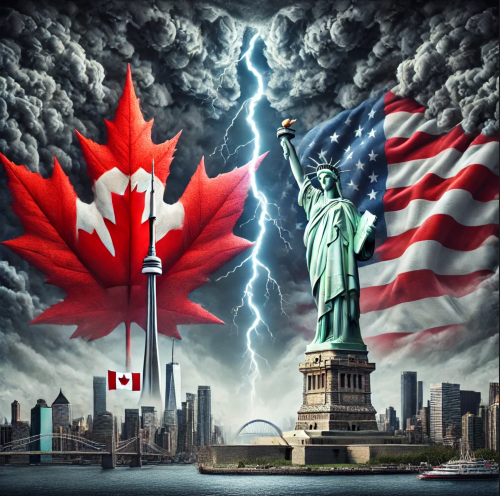Canada has long prided itself on being a friendly, reliable partner to its southern neighbor. Yet when President Trump imposed tariffs on Canadian goods—an act that many dismissed as mere bluster—it inadvertently lit a fire under a complacent nation. Rather than grumble about an American “bully,” Canada now has a unique opportunity to say thank you. This trade war is a wake-up call, exposing the risks of over-dependence on the U.S. and challenging Canada to reimagine its future in a rapidly multipolar world.
A Moment of Clarity
For decades, Canada has operated as the “little buddy” in a relationship dominated by the United States. Statistics show that nearly 75% of our trade flows with the U.S.—a dependency that leaves our economy vulnerable to external whims and political brinksmanship. Trump’s tariffs revealed not only that even our closest ally can disrupt our prosperity overnight but also that our complacency may have cost us the chance to diversify. This disruption forces us to reexamine our trading relationships and intellectual assets, urging us to reclaim control over our economic destiny.
Diversifying Trade and Rewriting Partnerships
The evolving global landscape necessitates that Canada broaden its trade horizons beyond the United States. By viewing regions such as Europe, South America, and countries within the Global South not merely as markets for raw exports but as collaborative partners in technology and manufacturing, we can begin to break free from traditional trade patterns.
Canada’s Comprehensive Economic and Trade Agreement (CETA) with the European Union, provisionally in force since 2017, has already eliminated tariffs on 98% of Canadian goods entering the EU, facilitating such collaboration. This partnership offers Canadian businesses preferential access to the EU market, which boasts annual economic activity of almost $18 trillion.
In South America, there is a growing interest in fostering balanced trade relationships with North America, China, and Europe. Approximately 37% of South American executives see opportunities to increase exports to replace goods from these markets, highlighting the region’s potential to leverage its neutrality.
Furthermore, Canada’s Indo-Pacific Strategy serves as a policy blueprint for diversifying exports across various industrial sectors, emphasizing closer economic engagement with nations in the Asia-Pacific region.
By establishing new free trade agreements and strengthening economic cooperation with countries in these regions, Canada can transform from a peripheral market into a proactive economic force. This strategic diversification will enhance Canada’s economic independence and resilience in an increasingly multipolar world.
Intellectual Property: Keeping the Value at Home
Beyond physical goods, Canada must take a hard look at its intellectual property. Too often, breakthrough innovations and critical research are sold off cheaply or licensed out under terms that allow our American counterparts to monetize our ideas far beyond their true worth. Imagine the potential if Canada established national centers for innovation—hubs where intellectual discoveries are nurtured, refined, and capitalized upon domestically. By retaining greater control over our knowledge economy, we can ensure that our discoveries contribute directly to Canadian prosperity rather than subsidizing another nation’s growth.
Rebuilding a Robust Defense Industry
Trade wars and tariffs are not only about commerce—they are about sovereignty. Recent events have shown that political rhetoric can change overnight. Just as the trade war revealed the risks of being overly dependent on a single partner, it also reminded us that international alliances can be unpredictable. Canadian defense spending currently hovers around 1.3% of GDP—far short of the NATO target of 2%—leaving us with a fragile military posture. Reinvesting in our defense industries is not an act of aggression but a necessary step to secure our future. Investing in domestic defense research and manufacturing can generate high-quality jobs and ensure that we are prepared to protect our sovereignty, whether from distant adversaries or local challenges.
National Pride and the Realities of Human Nature
Recent events have highlighted how quickly human nature can turn, even among longstanding allies. In early February 2025, during an NBA game, Toronto Raptors fans booed the U.S. national anthem in response to President Donald Trump’s imposition of tariffs on Canadian goods. Shortly thereafter, at an NHL game in Nashville between the Predators and the Ottawa Senators, some American fans reciprocated by booing “O Canada.” These incidents, though isolated, underscore a deeper awakening. They remind us that symbols matter and that complacency can lead to a loss of identity. Now is the time to embrace a renewed sense of patriotism that is not rooted in anti-American sentiment, but in a confident assertion of Canadian values and self-reliance.
So Thank Trump for this Great Awakening
Trump’s tariffs may have been intended as punitive, but they serve as a catalyst—a much-needed shock to our economic system. Canada should thank this disruptive force for revealing our vulnerabilities and prompting us to diversify, innovate, and secure our national interests. The future is multipolar, and if Canada wakes up and invests in itself, we can transform this challenge into an opportunity for sustainable, independent growth. It is time to move beyond the role of the “little buddy” and become a strong, self-reliant nation ready to face an uncertain world with confidence and pride.
